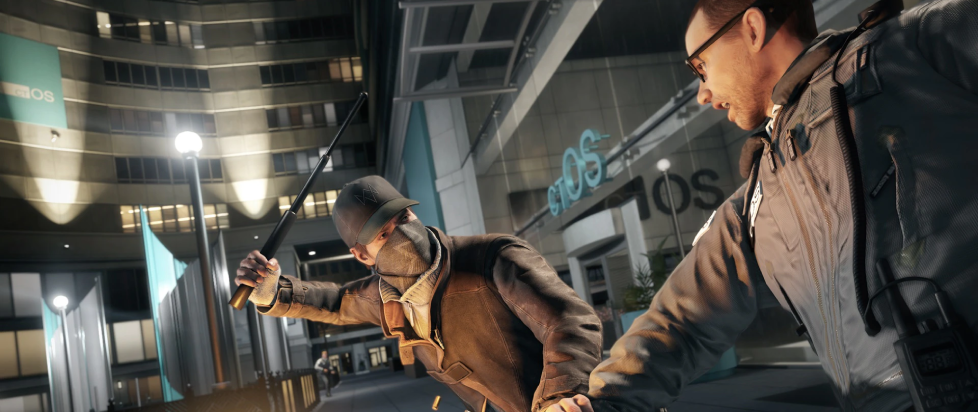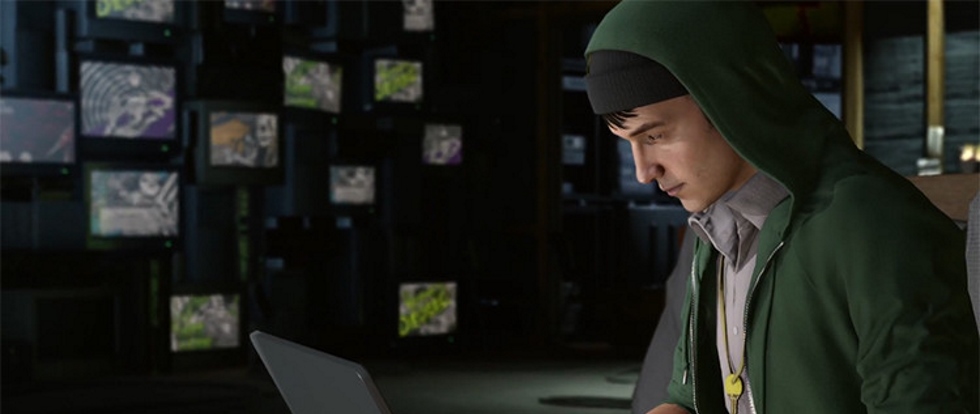
Chicago, the Ambiguous, and Ourselves
“Stop being a hero, Aiden. Let it go.”
Beneath the veneer of a near-future dystopian technocracy, Watch Dogs is a bildungsroman of a man seeking redemption and salvation. Following the journey of the vigilante Aiden Pearce, driven by a thirst for justice and vengeance against those whose nefarious schemes led to a car crash that claimed the life of his niece, this ambitious game explores the consequences of unchecked technological power and engages with pressing issues related to our complex reality.
In the game’s fictional rendition of Chicago, the city has become a hotbed of corruption and conspiracy, teeming with perverts, maniacs, gangsters, and pedestrians who often accuse me of driving like a mad man. Under the reign of government officials and their underworld counterparts, Chicago is torn into scattered pieces. There are demonstrators outside Blume waving banners against CTOS, while LCD billboards on the road side are promoting its credibility. There are politicians and mob bosses boasting a glorious history of the past and grand design of the future on the radio, while a group of people in exile plots against them. We can investigate human trafficking, serial murder, arms trade, and intercept the convoys escorting social scumbags.
As Pearce navigates this glitzy world, we are not merely steering a vigilante through the virtual streets of Chicago; we are invited to ponder something more. Pearce never hesitates to take action, whether it is to exact revenge on those who have harmed him and his family or to stop potential criminal activities. His smartphone is a wand that turns the city’s infrastructure into clever snares, from redirecting traffic signals, raising blockers and road spikes, to overloading building utilities, transformers, and steam pipes. And it is the chaos he creates that makes him a frequent target of the police. Then there comes an ironic scene. The authorities spend years of time investigating Pearce’s car crash in vain, but when it comes to chasing the fox, Chicago P.D. immediately becomes a relentless hunter with high efficiency, skilled at tracking locations, deploying persistent vehicular pursuits, and maintaining a watchful eye with helicopters patrolling the sky.

The unique features of a local environment always give special characteristics to its inhabitants. As a citizen of Chicago, Pearce is not so much a hero as a narcissist indulging in his illusion of justice and a sensation of being a Punisher characterized by moral ambiguity. He understands that his magic cannot work properly without CTOS, and he clearly knows the system’s violation of personal privacy. But to avenge his niece, he decides to take advantage of the system instead of bringing it to light. A similar ambiguity also occurs in the reputation system with no consistency. To unintentionally injure civilians hurts the reputation, but to indiscriminately kill dozens of “bad guys” in missions is accepted as warranted violence. Such mechanics are worryingly absurd, as they imbue players with a blatantly selfish justification for violent acts, asking us to internalize this pattern of ambiguity while enjoying the sheer pleasure of committing massacres.
Unlike the design of the reputation system (which is discarded in the sequel), CTOS is characterized as a fearsome entity with formidable powers throughout the series. However, this depiction ultimately leads to a reductionist solution to inspire a revolt against an established order, as it turns a campaign that should encompass numerous elements into a single fight against a machine. At its core, Watch Dogs holds a rather pessimistic attitude towards individual efforts in bringing about change, as Pearce at last fails to contain the spread of CTOS. And it is because of this treatment that I find the story barely satisfactory. Pearce could have been more radical in challenging the decadent regime, but in the end he gives in, makes peace with them, and continues to roam the streets of Chicago, with real dangers dismissed as mere MacGuffins of the digital world, as Matt Sayer pointed out.
Outside the fictional context, Watch Dogs used to be criticized due to the controversy surrounding its graphical downgrade, as it failed to present a visually impressive world showcased at E3. However, this is not uncommon, considering that Ubisoft is inevitably subjected to the grueling production schedules of the gaming industry. Operating in a highly competitive milieu, game companies cannot afford to take unlimited risks. Accordingly, as the first step, they are more inclined to generate buzz among players by releasing trailers filled with dazzling effects and cut scenes. Meanwhile, the importance of final product is placed in a secondary position and further diminished by disclaimers. Faced with the logic of the production process, players have little access to what is really going on inside the studio and are thus given limited choices. There is nothing much to do but either wait for release or pre-order as an act of support.
Luckily, even though a decade’s time has almost passed, the city of Chicago is still willing to inform us of the power of critical analysis while confronting the digital landscapes we traverse. From the intricate storytelling that looks into the ambiguous nature of morality and justice, the blurred lines between hero and villain, and the lost battle against a technocratic dystopia, Watch Dogs combines thrilling gameplay with an undercurrent of thought-provoking themes, which ultimately results in a gaming experience that is not only action-packed but intellectually stimulating. But in terms of the ability to enact change, we find ourselves in the same predicament as Pearce. While Pearce can take on his role as the vigilante, we are common people bound by reality.
———
Zonghang Zhou is a small-town boy seeking to write about games and culture in the English department. You can contact him at zhzhou12 at hotmail dot com





